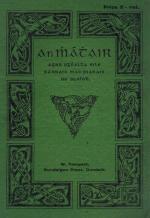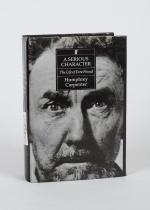129. [Montague, John] Dorgan, Theo.
Typescript Draft MS for a book of poetry by Theo Dorgan. With occasional manuscript corrections / suggestions / annotations by Dorgan’s early mentor John Montague, the Typescript MS was held among the private papers of John Montague in his West Cork Home. The typescript includes poems like “Closed Circuit”, “The Promised Garden”. Montague is approving several of the poems by simply applying a tick. John Montague made suggestions in pencil on the structure of “Elegy for a Schoolfriend” and more in depth-suggestions on “Nasty Archer”, “Her Body”,″The Width of a Room Between Us”, “Return”, “Reconciliation”, “Sunday Afternoon”. When asked about helping to date this early draft of his poetry, Theo Dorgan immediately gets back to us and he places it from memory into the early 1980’s. Theo Dorgan was surprised and seemingly chuffed that John Montague held on to this Manuscript and he recalls: “These poems, some in revised versions, make up the backbone of my first published collection, ‘The Ordinary House of Love’.” Dorgan continues: “I’m happy to say that most of them survived Montague’s eagle eye, which was of course a great comfort to me at the time. Still is!” Some of these poems selected had previously been published as broadsheets etc. but the skeleton of the Draft hints already at readying it for publication. Theo Dorgan graciously gives us even more information: “Some of the poems in the eventual book go back to when I was a student, others were definitely written in the second half of the 80s. The bulk of it, however, is in this MS. I base my estimation in part on the fact that what you have is a typescript produced, it appears, on the IBM golfball machine that was the pride and joy of Triskel Arts Centre. That machine was bought in 1980 or 1981, I’m fairly sure of that. I was Literature Officer there, then.” Theo Dorgan was part of John Montague’s circle of mentored poets, even though in an email-exchange with him about this typescript he mentions that “John Montague worked far more with Thomas McCarthy, Maurice Riordan and Gregory O’Donoghue than he did with me, and in many ways Gregory O’Donoghue was at that stage the most accomplished of us all – the only one included in JM’s Faber Book.” What followed then in our conversation with Theo Dorgan is a great example why manuscripts, letters, autographs, typescripts and the connections we often make with documents from the past have such meaning in explaining our emotional ties with people who matter to us on our way of forming personality. They are memories transforming into images, floods of empathy and nostalgia for personal moments lost but treasured because they helped us form our values. Presented with the old typescript, Theo Dorgan’s emotionality is tangible and he confesses more in an internal dialogue with himself and John Montague than with us: “I’m sorry to say that the reason John Montague worked with those others more than he did with me is because, in my shameful, youthful arrogance, I much preferred to trust my own judgement, and also, I suspect, because I was closest to John in temperament and feared coming unduly under his influence. That said, there was no-one whose good opinion of a poem I valued more, and we were close all our lives after. Very likely it was a case of old stag/young stag ! Montague taught us by indirection, he made his extensive library of modern and contemporary poetry available to us without stint, would wait for us to find an affinity (as, e.g. mine with Robert Graves and Galway Kinnell) and would then, in a long, ongoing conversation, help us to understand what it might mean for our own poems that we felt such affinities. A guided companionship in reading and making, if you will.”
Ireland, c.1981-1982. A4. 43 pages typescripts. Paperclipped. Very good condition with only minor signs of external wear. Some fingerstaining and residue of rust from the paperclip. Wonderful and extremely valuable document of not only a collaboration between two of Ireland’s landmark writers but moreover witness to the becoming, the birth of a true poet. Also included (from a different source) is a second printing of the first edition of the subsequent publication “The Ordinary House of Love” – signed by Theo Dorgan. Right at the beginning of the printed version, instead of a dedication to John Montague, Theo Dorgan placed a quote from Montague’s poem “Wine Dark Sea”: ‘For there is no sea / it is all a dream there is no sea / except in the tangle / of our minds; / the wine dark / sea of history on which we all turn / turn and thresh / and disappear.’ (Collected Poems, page 255). Provenance of the annotated typescript: From the private collection of John Montague’s papers in his recently sold West Cork Home.






![Kipling, Many Inventions [Signed by Kipling].](/images/thumbnails/100251AB.jpg)
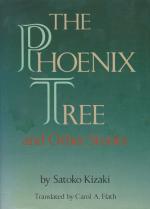


![Lao She [Shu Qingchun]. The Drum Singers. [The rare english Translation].](/images/thumbnails/31634AB.jpg)
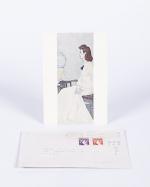
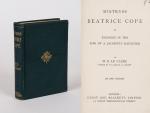
![Lescure, Jean / [André Frénaud] - Original Typescript with manuscript annotations and corrections of "Poèmes métaphysiques".](/images/thumbnails/29906AB.jpg)
![Sinclair Lewis, It Can't Happen Here [The Novel that tells you what will happen to your family if America gets a Dictator].](/images/thumbnails/31261AB.jpg)


![Robert Lowth, [On the Sacred Poetry of the Hebrews] De Sacra Poesi Hebræorum](/images/thumbnails/31334AB.jpg)
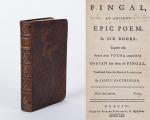
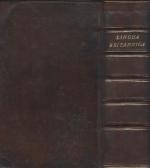


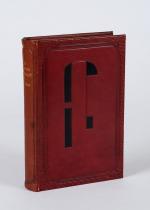

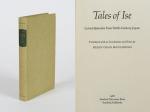

![McGahern, That They May Face the Rising Sun. [SIGNED Proof].](/images/thumbnails/31821AB.jpg)

![Milton, [Das verlorene Paradies] Das Verlohrne Paradies](/images/thumbnails/100297AB.jpg)
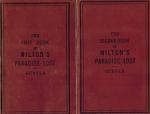
![The Mirror - A Periodical Paper, Published at Edinburgh in the Years 1779 and 1780 ["Veluti in Specula"].](/images/thumbnails/29831AB.jpg)


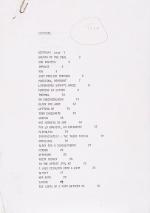






![[John Morrison], Poems on Several Occasions by the late Matthew Prior.](/images/thumbnails/31233AB.jpg)
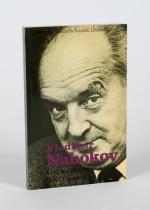
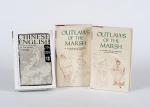
![[Nerses IV]. Preces Sancti Nersetis Clajensis Armeniorum Patriarchae.](/images/thumbnails/31378AB.jpg)
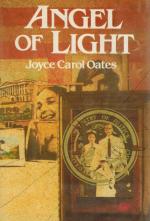
![Edna O'Brien, House of Splendid Isolation [Signed and Inscribed]](/images/thumbnails/31078AB.jpg)

![Thomas Mann / Otto Nückel - Der kleine Herr Friedemann [signiert]](/images/thumbnails/29467AB.jpg)
![Sir Thomas Overbury, His Wife [Original Edition from 1632]](/images/thumbnails/31192AB.jpg)
![Boris Pasternak - Doktor Zhivago. [Rare Original Russian Edition]](/images/thumbnails/29201AB.jpg)
